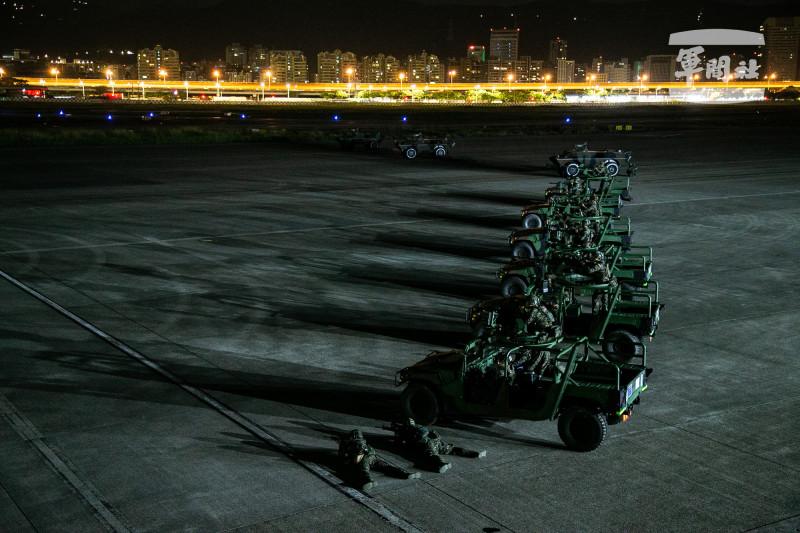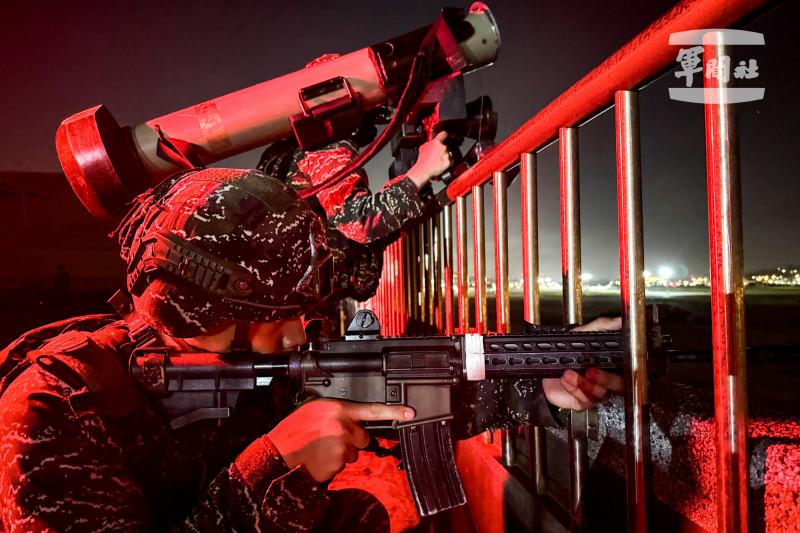Combat units of the eighth day of the annual Han Kuang exercises today continued to simulate urban combat and defense drills.
At Taipei International Airport (Songshan airport), which is a joint civil-military facility, units conduct anti-airborne drills overnight in a simulation of repelling an enemy assault.
The exercise reportedly tested how personnel respond when informed of an enemy attack under unexpected conditions, sources said.

Photo courtesy of the Military News Agency
Units at the airport were not informed of the drill prior to its start to test their response capabilities, a source said, adding that the drill was crucial to the central government’s security.
The Third Theater Command, responsible for defending northern Taiwan, simulated a heliborne assault in which troops were airdropped into the airport, the Ministry of National Defense's Military News Agency said.
Air Force, Military Police and Marine Corps personnel engaged the simulated enemy using air defense weapons and other munitions, while additional weapons systems stationed near Songshan Air Base were also deployed, it said.

Photo courtesy of the Military News Agency
A smokescreen was deployed around the landing site to limit enemy visibility, as Marine Corps personnel simulated firing shoulder-launched FIM-92 Stinger missiles at the airborne threat, the agency said.
Defense forces then deployed various armored vehicles, tactical vehicles and artillery, gradually repelling the simulated enemy with firepower, the agency said.
In February, the Marine Corps deployed personnel of the 66th Marine Brigade to the airport to bolster its defenses, with a source close to the matter saying they were there to defend against “decapitation strikes.”
As this year’s exercise has now entered its final stages, some units have begun to practice how to manage equipment failures and undertake field repairs to restore damaged vehicles to combat strength.
The 234 Mechanized Infantry Brigade also conducted a defensive drill in central Taiwan at a rest stop near National Freeway 3, where it repelled an attack by simulated enemy troops.
Civilian air raid defense drills continued today in Kaohsiung and Pingtung County from 1:30pm to 2pm.
Due to damage from Typhoon Danas last week, Tainan did not participate in the exercise to not impede disaster recovery efforts.
The Han Kuang drills are scheduled to conclude on Friday.

Taiwanese can file complaints with the Tourism Administration to report travel agencies if their activities caused termination of a person’s citizenship, Mainland Affairs Council Minister Chiu Chui-cheng (邱垂正) said yesterday, after a podcaster highlighted a case in which a person’s citizenship was canceled for receiving a single-use Chinese passport to enter Russia. The council is aware of incidents in which people who signed up through Chinese travel agencies for tours of Russia were told they could obtain Russian visas and fast-track border clearance, Chiu told reporters on the sidelines of an event in Taipei. However, the travel agencies actually applied

Japanese footwear brand Onitsuka Tiger today issued a public apology and said it has suspended an employee amid allegations that the staff member discriminated against a Vietnamese customer at its Taipei 101 store. Posting on the social media platform Threads yesterday, a user said that an employee at the store said that “those shoes are very expensive” when her friend, who is a migrant worker from Vietnam, asked for assistance. The employee then ignored her until she asked again, to which she replied: "We don't have a size 37." The post had amassed nearly 26,000 likes and 916 comments as of this

New measures aimed at making Taiwan more attractive to foreign professionals came into effect this month, the National Development Council said yesterday. Among the changes, international students at Taiwanese universities would be able to work in Taiwan without a work permit in the two years after they graduate, explainer materials provided by the council said. In addition, foreign nationals who graduated from one of the world’s top 200 universities within the past five years can also apply for a two-year open work permit. Previously, those graduates would have needed to apply for a work permit using point-based criteria or have a Taiwanese company

The Shilin District Prosecutors’ Office yesterday indicted two Taiwanese and issued a wanted notice for Pete Liu (劉作虎), founder of Shenzhen-based smartphone manufacturer OnePlus Technology Co (萬普拉斯科技), for allegedly contravening the Act Governing Relations Between the People of the Taiwan Area and the Mainland Area (臺灣地區與大陸地區人民關係條例) by poaching 70 engineers in Taiwan. Liu allegedly traveled to Taiwan at the end of 2014 and met with a Taiwanese man surnamed Lin (林) to discuss establishing a mobile software research and development (R&D) team in Taiwan, prosecutors said. Without approval from the government, Lin, following Liu’s instructions, recruited more than 70 software